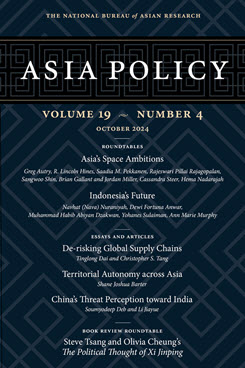De-risking Global Supply Chains
Looking Beyond Material Flows
This essay examines supply chain de-risking driven by two forces: (1) the renewed concerns of the U.S. and its allies about supply chain resilience and (2) China’s long-standing strategy to redefine the global order.
Note: This is the second in a series of four essays in 2024–25 on trade and supply chains in Asia made possible by the generous support of the Hinrich Foundation.
Executive Summary
MAIN ARGUMENT
A defining feature of global supply chains is they are powered by material, information, financial, and human flows. By examining these multiple flows in the evolution of global supply chains, our analysis goes beyond the singular focus on material flows that is common in recent economic and foreign policy discourse. Another defining feature of global supply chains is the strategic interaction between different actors. Following this line of thinking, we argue that de-risking is not a unilateral option for the West and its developed economy partners but rather an interactive and fluid development taking place around the globe. This can be seen in the U.S.’s growing emphasis on improving supply chain resilience through reshoring, nearshoring, and friendshoring, as well as in China’s diversification into markets such as Russia and the global South, with broader implications for major economies. Looking beyond material flows to information, financial, and human flows is important to monitor these indicators of the ongoing transitions in global supply chains.
POLICY IMPLICATIONS
- Policymakers must recognize that de-risking is not a unilateral process but involves strategic interactions among multiple global actors.
- It is imperative to consider the implications of information, financial, and human flows, in addition to material flows, to develop effective de-risking strategies.
- Ensuring political stability and policy continuity is essential to effective de-risking, particularly in the context of changing administrations and economic policies.
- In implementing de-risking, efforts should ensure coordination across the four types of flows while addressing the challenges of increased complexity and potential lack of visibility into operations.
- The role of emerging economies in de-risking is critical, as they stand to benefit significantly but also play a key role in achieving diversified and resilient supply chains.
Tinglong Dai is the Bernard T. Ferrari Professor of Business and Professor of Operations Management and Business Analytics in the Carey Business School at Johns Hopkins University (United States).
Christopher S. Tang is a UCLA Distinguished Professor and the Edward W. Carter Chair in Business Administration; Senior Associate Dean, Global Initiatives; and Faculty Director, Center for Global Management in the Anderson School of Management at the University of California, Los Angeles (United States).
About Asia Policy
Asia Policy is a peer-reviewed scholarly journal presenting policy-relevant academic research on the Asia-Pacific that draws clear and concise conclusions useful to today’s policymakers. Asia Policy is published quarterly in January, April, July, and October and accepts submissions on a rolling basis. Learn more


